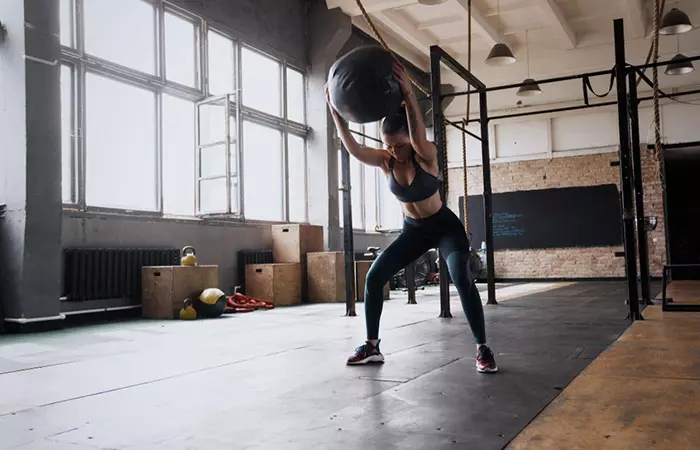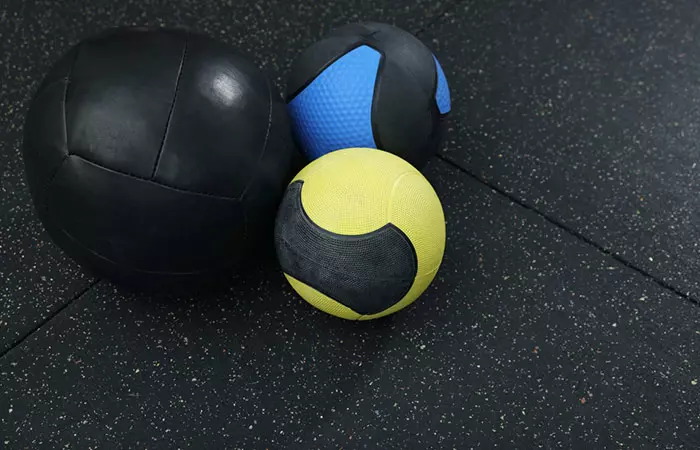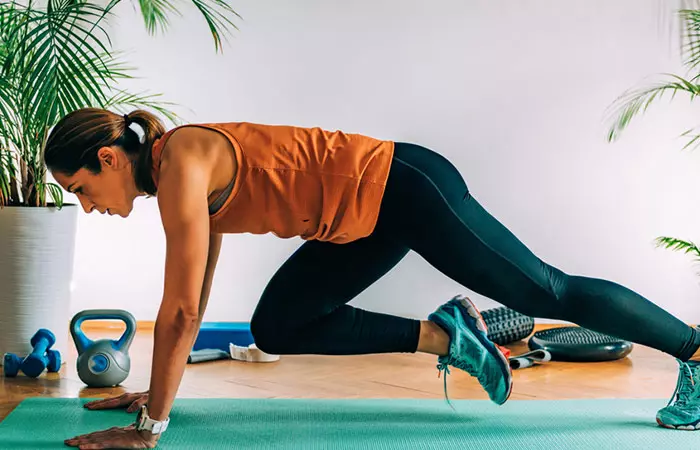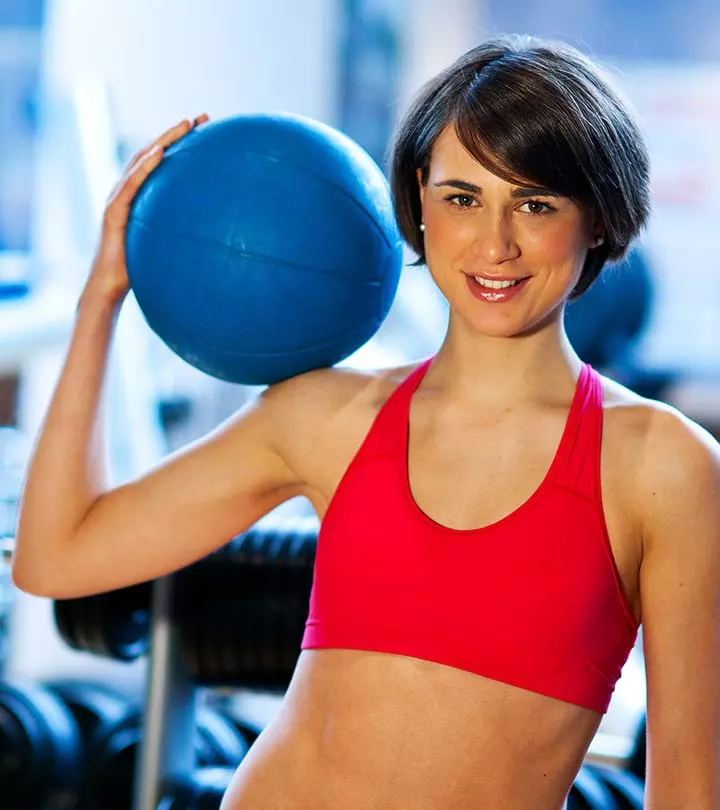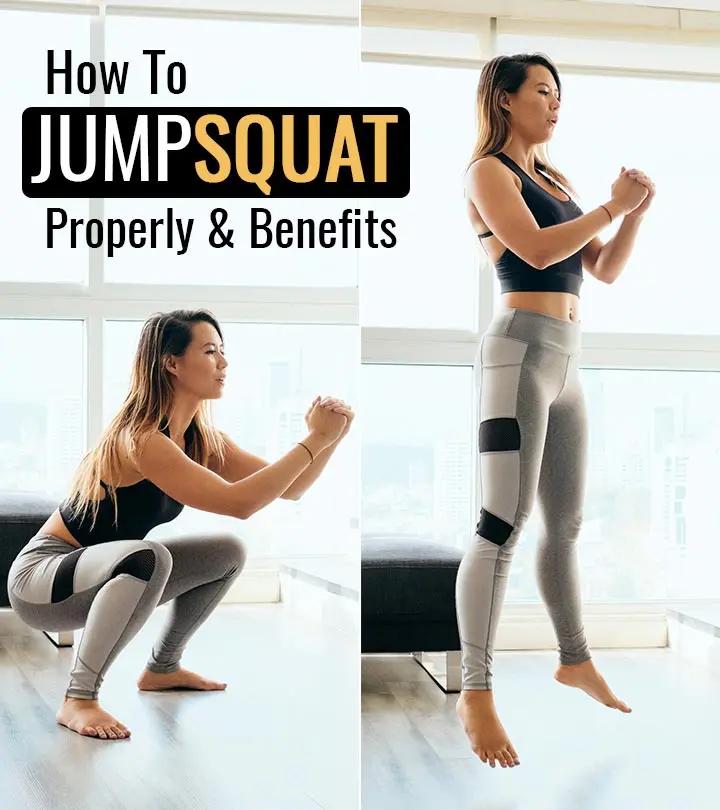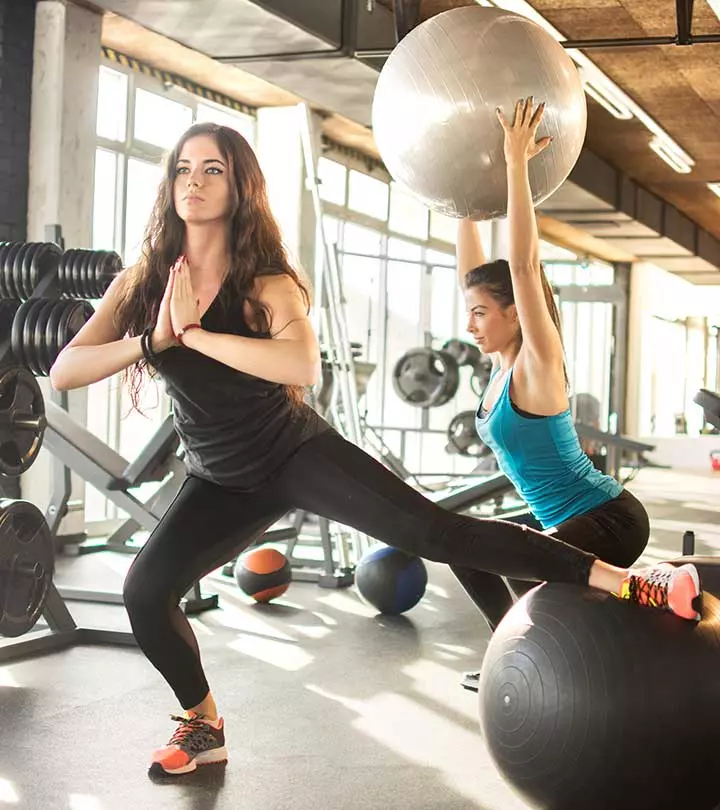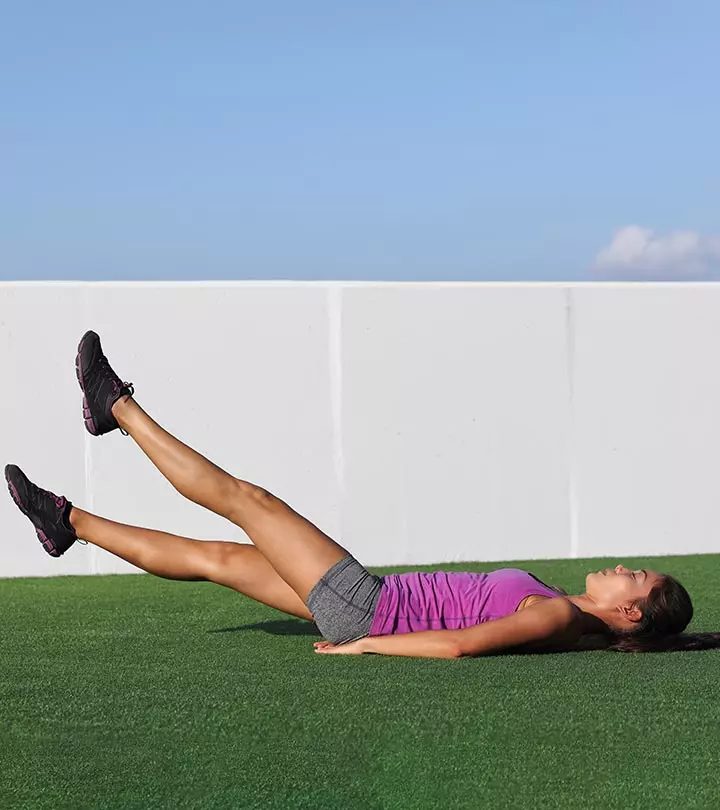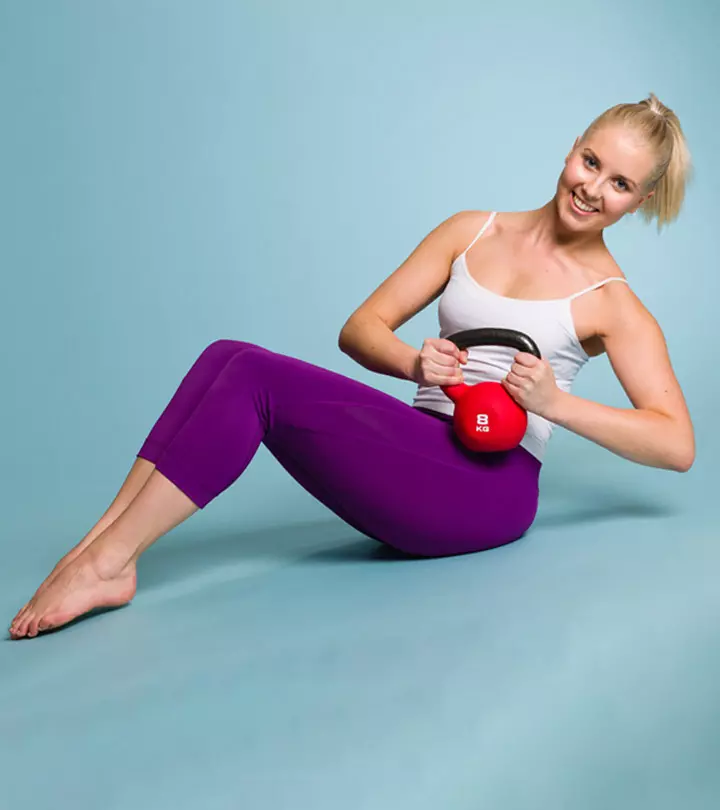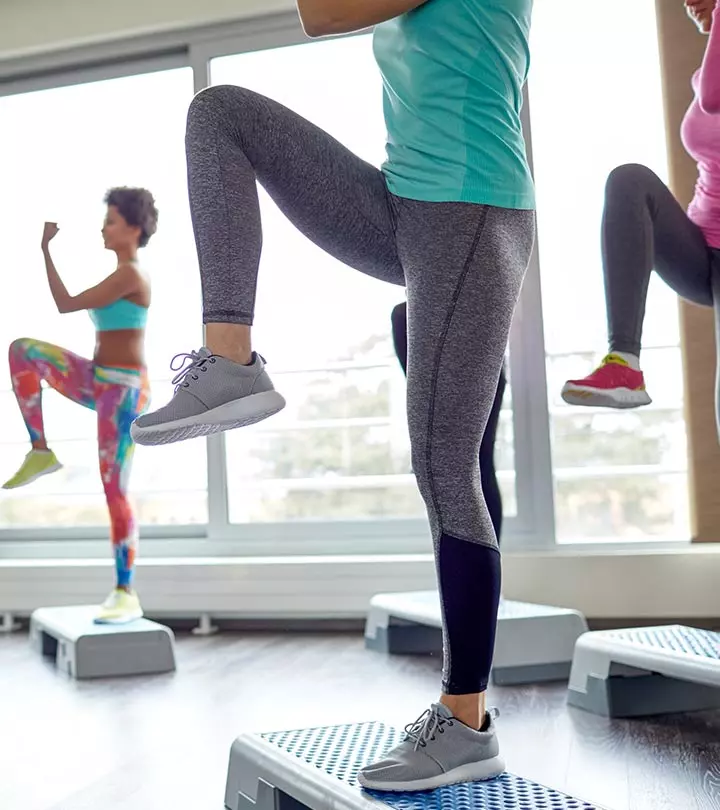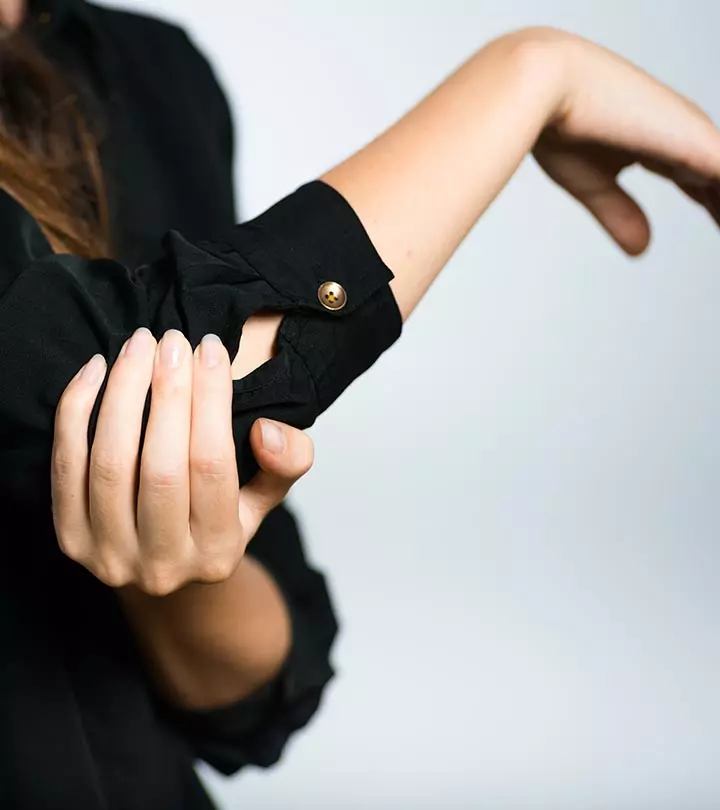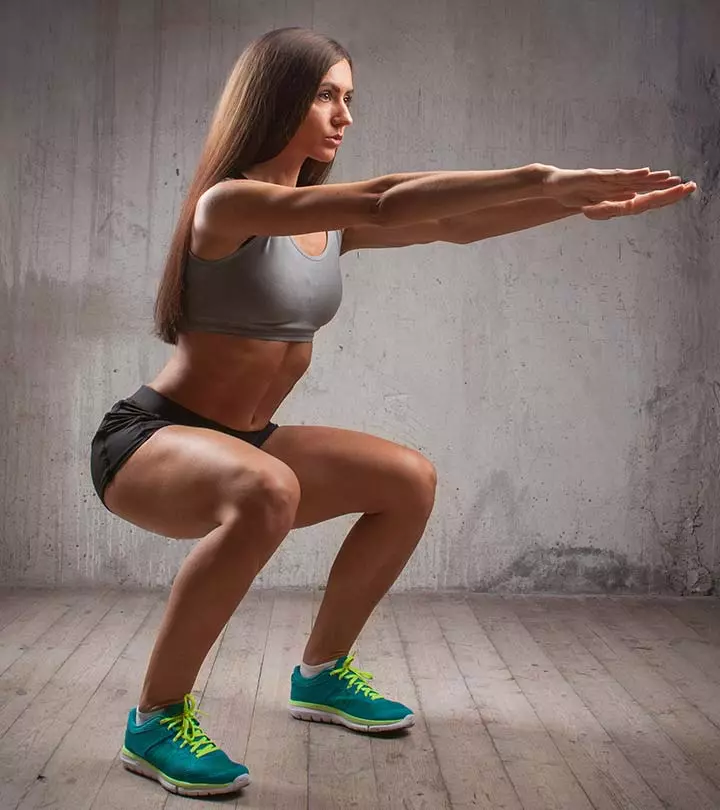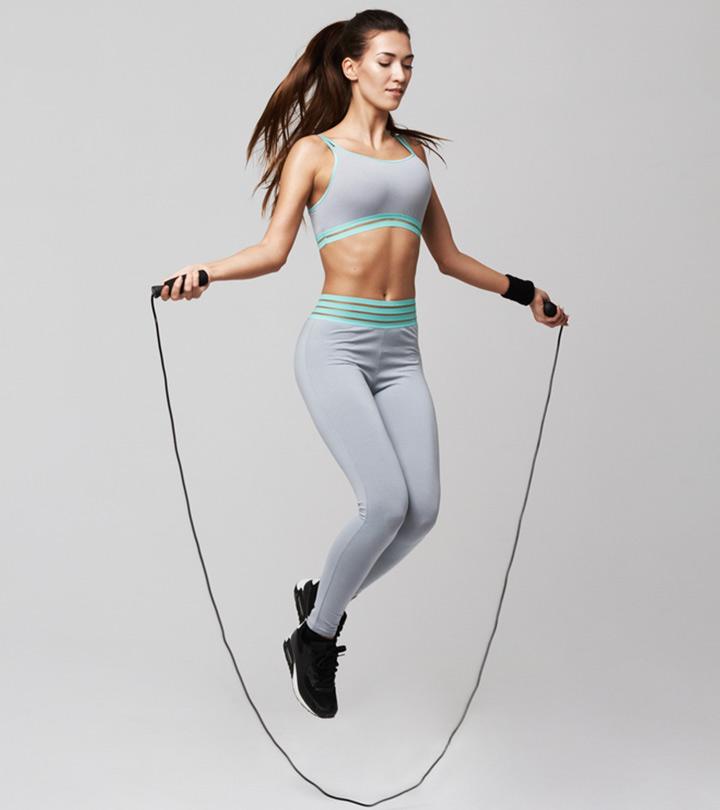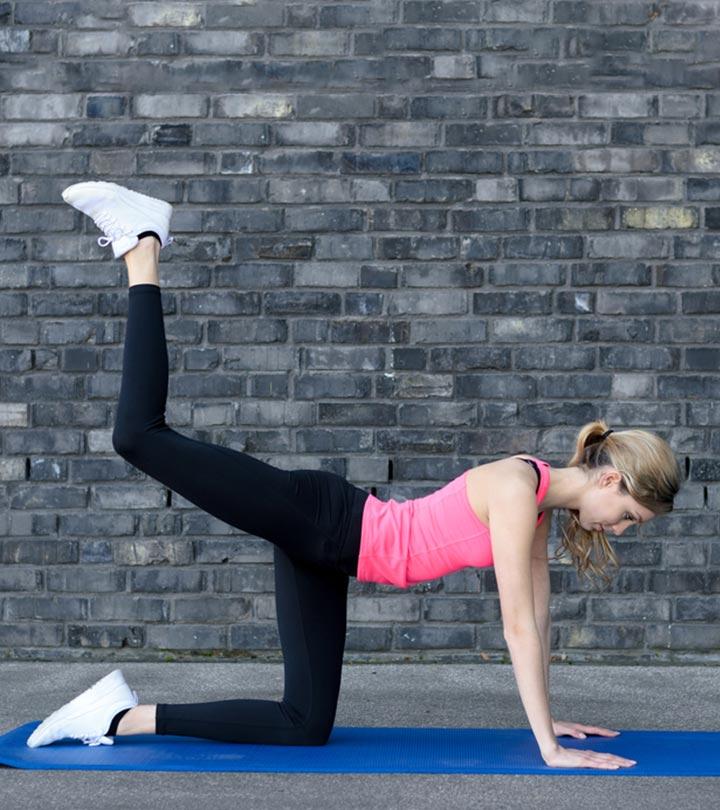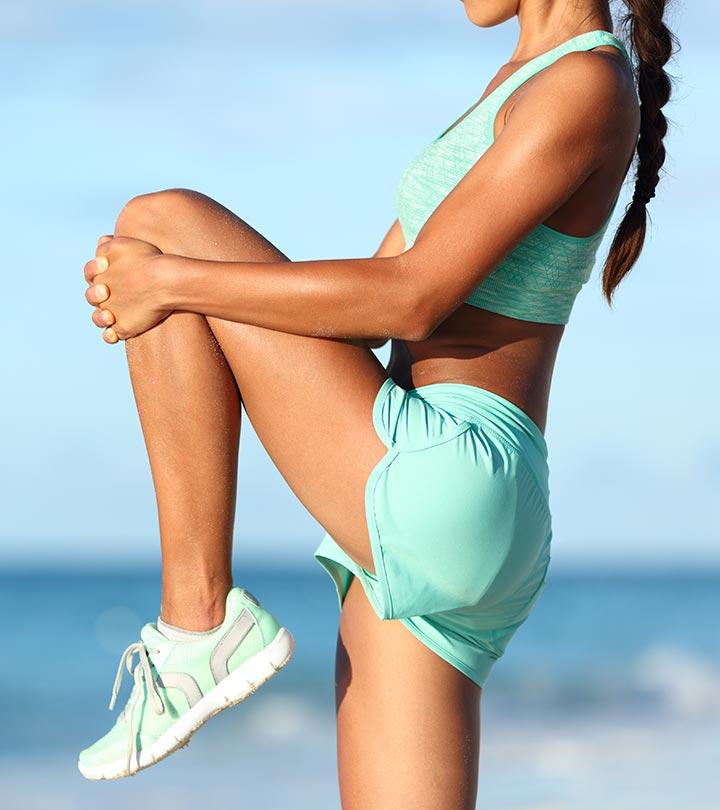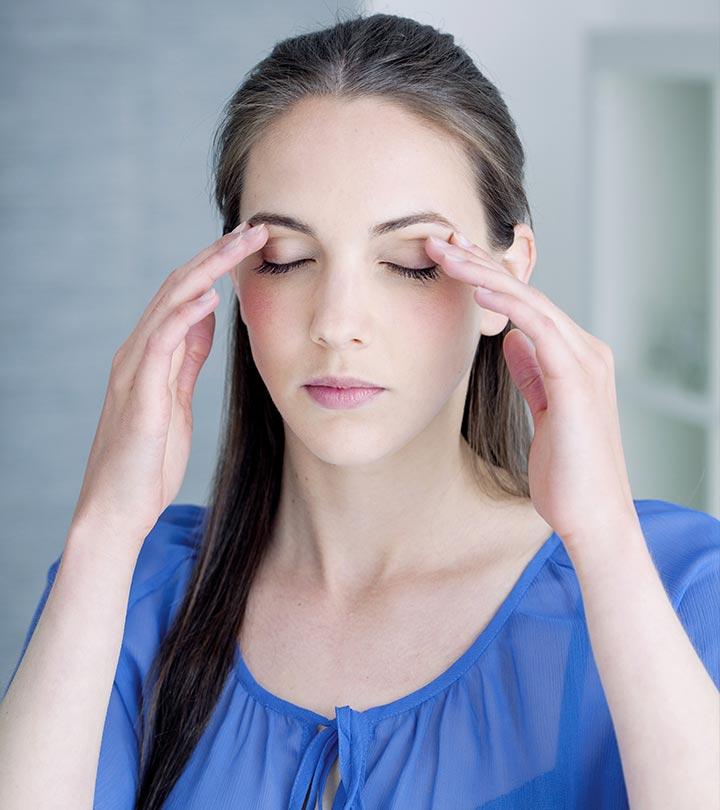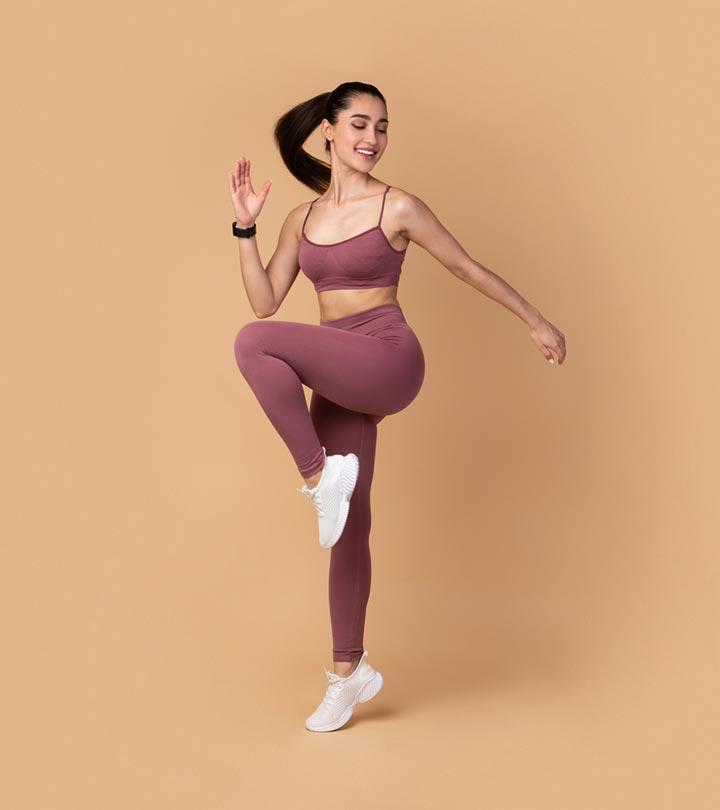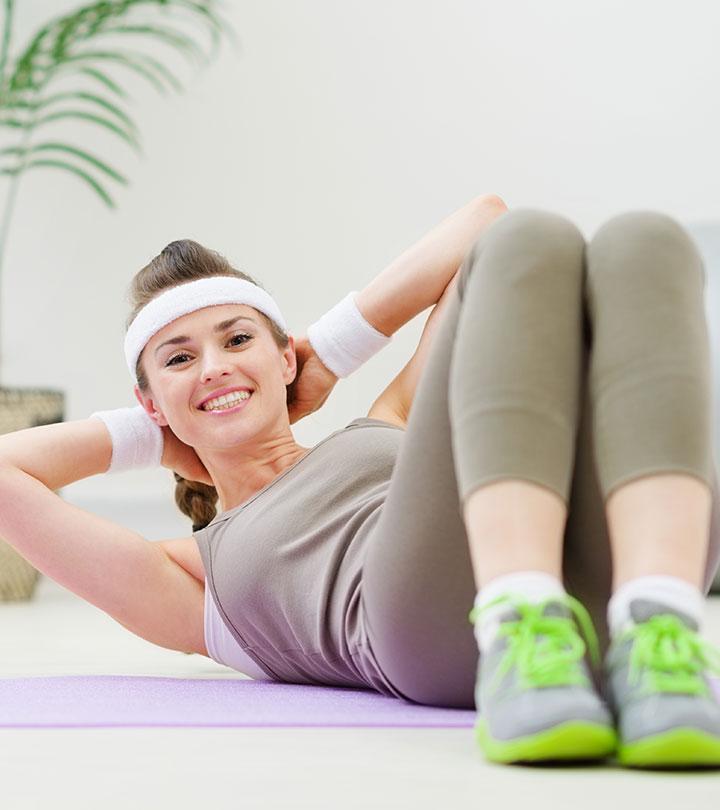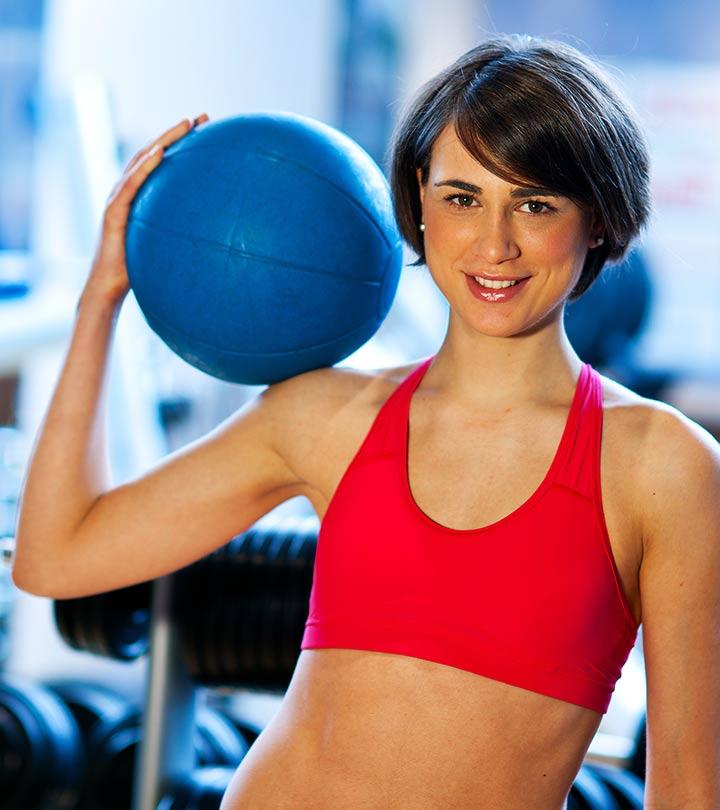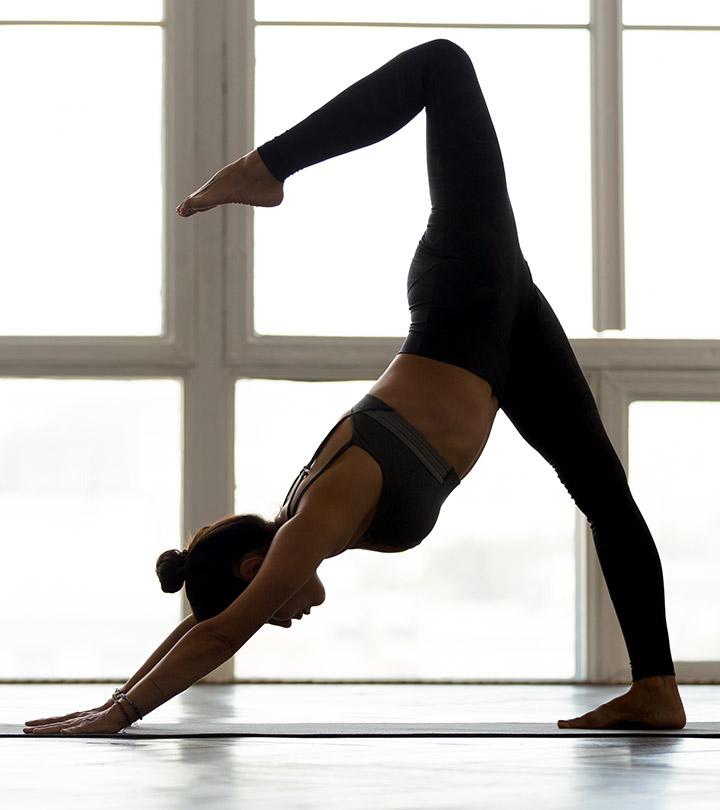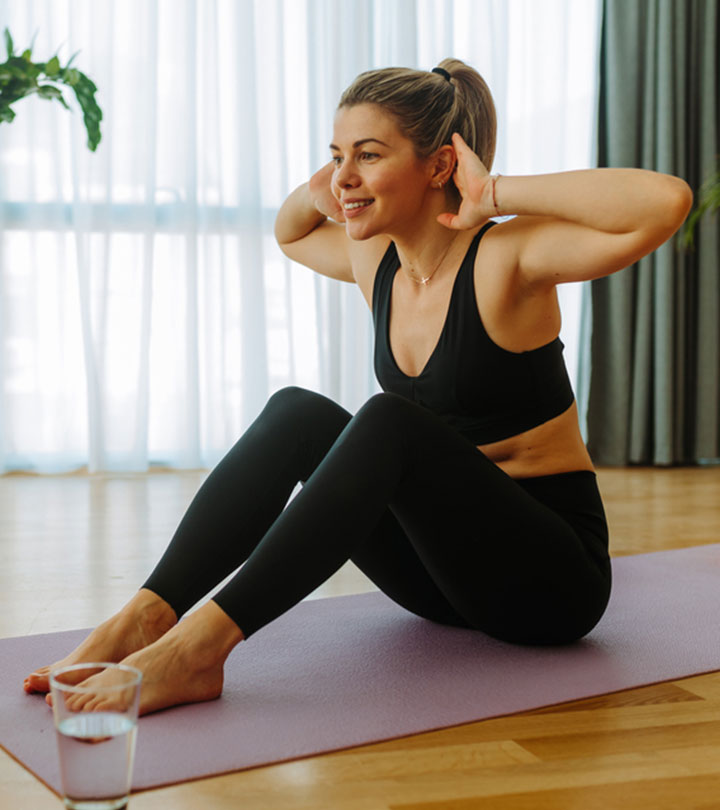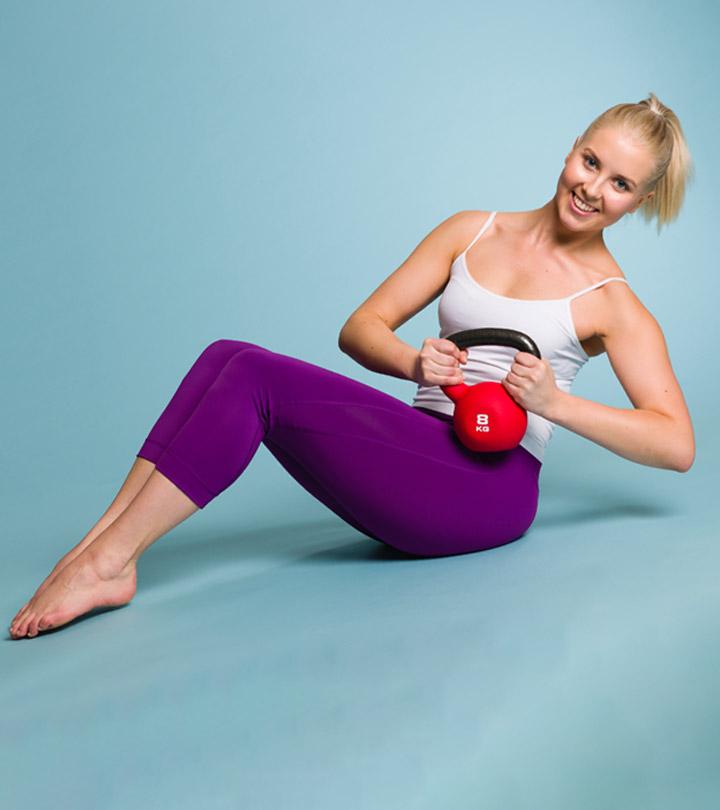How To Do Medicine Ball Slams – Muscles It Works & Benefits
Try out some effective methods to boost the strength of your muscles with this equipment.
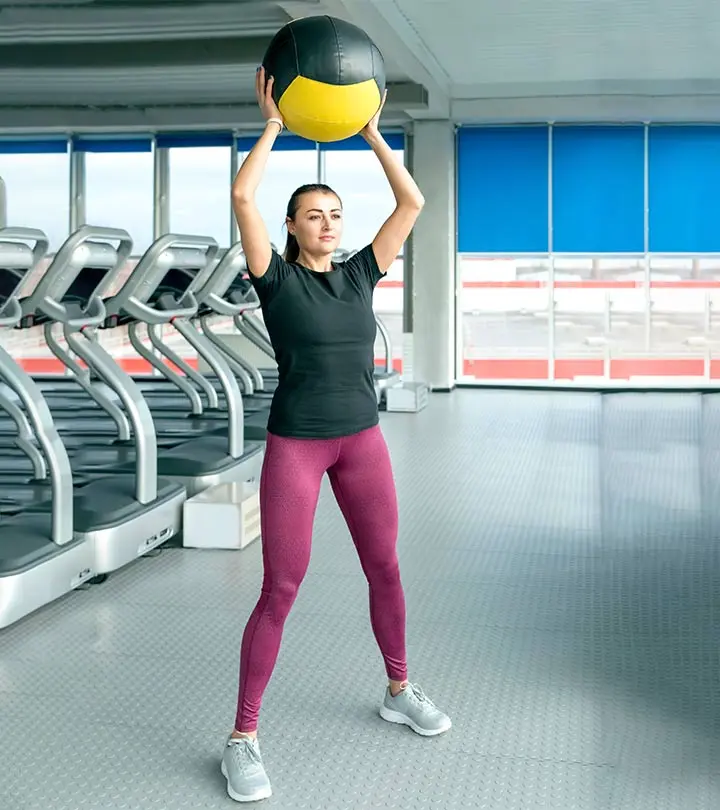
Image: Shutterstock
Medicine ball slam exercise is a major calorie burner. These full body medicine ball exercises work on your shoulders, glutes, thighs, core, back, and arms. It is dynamic and helps improve muscle strength and power. But you must know how to perform it properly with the correct form. Read on to learn how to do medicine ball slam exercise and its benefits. Swipe up!
 Workout Blueprint: Medicine Ball Slams
Workout Blueprint: Medicine Ball Slams- Frequency: 3 times per week
- Benefits: Boost stamina, strength, and functional fitness.
- Equipment Needed: Medicine ball
- Space Required: Large area
- Assistance Required: No
- Who Should Avoid: Anyone with a shoulder or wrist injury and anyone who has undergone surgery recently.
In This Article
How To Do Medicine Ball Slams
On the surface, medicine ball slams may look easy. But doing them incorrectly can cause muscle pull and pain. To avoid that, here’s a step by step guide on how to do medicine ball slams:
- Stand with your feet shoulder-width apart, knees slightly bent, and hold a 4-6 pound medicine ball in your hand.
- Lift the medicinal ball overhead with your arms extended.
- Look straight ahead and inhale.
- Bend forward at the waist and use your core muscles to throw the ball down in front of your feet with as much force as possible. Contract the abdomen effectively and exhale while doing the exercise.
- Let the arms follow through the movement to prevent falling.
- In the end, the heels should be on the floor and knees slightly bent.
- If it is a bouncy ball, let the ball bounce back, and you catch it. If the ball does not bounce, then keep your abdomen contracted and pick up the ball.
- Lift the ball back to the starting position, inhale, and slam!
 Quick Tip
Quick TipNote: Do not bend forward completely to life the ball while performing this exercise. Squat and lift the ball to prevent injury to the lower spine.
As you do this exercise, you activate and work the following muscles:
Which Muscles Do Medicine Ball Slam Work On?
Medicine ball slams work the abs, deltoids (shoulders), biceps and triceps (arms), lats (upper back), glutes (hips), quads, hamstrings, and calves (legs). It is basically a full-body workout and has many benefits. Let’s take a quick look at what those benefits are.
What Are The Benefits Of Medicine Ball Slam Workout?
The medicine ball slam is done for developing power, strength, and speed. It works best for triceps, abdomen, shoulders, calves, back, glutes, quads, etc. This exercise increases heartbeat and burns a good number of calories.
- It burns calories.
- It is a full-body exercise (1).
- Improves stamina and muscle power (2).
- Have shown to improve cardiometabolic stimulus in children (1).
- It is great for strength training (3).
- Improves functional fitness (4).
- Improves eye and body coordination.
- Burns fat but retains lean muscle.
- Improves full-body muscle tone.
- Improves sports performance.
Anthony Lawrence, a blogger and consultant, started adding medicine ball slams exercises to his workouts and found it to be more enjoyable than his regular exercise routine. He writes, “This was great exercise and fun. Not many muscles were missed and when I stopped after twenty minutes I felt that I’d had an exceptionally good workout. In some ways, this is similar to moving about with hand weights like light dumbbells, but using the ball is more fun (i).”
According to a survey, around one-third of surveyed participants, that is 24.2%, who were 18 years and older met the Physical Activity Guidelines for muscle-training and aerobic activities. Also, the study conducted in the U.S. indicated that 28.3% of men met both physical activity guidelines compared to 20.4% of women. This percentage decreased for men and women as they aged.
But before you pick up a medicine ball and start working out, you must know that there are various types of medicine balls. Here’s a list and the kind of med ball you need for various functions.
What Kind Of Medicine Ball Do You Need?
Medicine ball throws differ in many ways. The Medicine balls come in various sizes and weights (2-50 pounds or 5-20 pounds). Medicine balls that are heavier are designed to be slammed; they don’t bounce and have a rubber surface to absorb the throwing impact. These balls are great for overhead medicine ball exercises like slams, chest pass, squat throws, lateral throws, med ball plank, med ball push-ups, and board jump to pass.
The lighter medicine balls are designed for ball throws and have a rough or zig-zag surface for better grip. They also vary in size and are larger than the ones used in weighted ball exercises. They are good for crunch throws, side throws, overhead wall ball toss, and other wall ball exercises.
Note: Medicine balls are different from BOSU balls. BOSU balls are larger and are meant to improve balance and stability.
Choose the right kind of ball with the right weight. Do not start with a heavier ball as you may injure yourself. Start with the lightest of the lot and improve your stamina and muscle power before moving on to a heavier med ball. Here’s a sample workout regimen for you.
Sample Workout Regimen
Start a stopwatch and perform the following routine:
- 8 medicine ball slams, 1 burpee, 10 seconds rest.
- 8 medicine ball slams, 8 mountain climbers, 15 seconds rest.
- 8 medicine ball slams, 8 jump squats, 15 seconds rest.
- 8 medicine ball slam, 8 crunches, 15 seconds rest.
You may add other exercises to amp this sample workout routine. Keep the following precautions in mind.
 Quick Tip
Quick TipPrecautions
- Always warm up for 10 minutes before starting to exercise.
- Before beginning the medicine ball slam, check the bounciness and weight of the ball.
- If you are using a bouncy ball, it can bounce back to your face. Do not throw the ball straight down. Throw it a bit forward.
- Avoid using more than 2-6 pound med ball in the first go.
- Train with a trainer initially to get the posture correct.
Infographic: A Simple Guide To Medicine Ball Slams
The medicine ball is a versatile and fun workout equipment you need to add to your routine. It provides resistance and added weight to help strengthen the muscles. This, in turn, boosts the calorie-burning process while also working out all major muscle groups. Check out the infographic below to learn the benefits of medicine ball workouts. Illustration: StyleCraze Design Team
Core exercises done with a medicine ball help tone and strengthen your arms, shoulders, thighs, glutes, and core muscles giving you a full-body workout. Functional training, agility exercises, and plyometric medicine ball exercises can help improve athletic conditioning. Explosive medicine ball exercises, rotational medicine ball exercises, and partner medicine ball exercises can add variety to your routine.
These not only help burn the excess fat but also help improve stamina, eye-body coordination, muscle tone, and functional fitness. Maintaining the correct stance and posture is important in doing these exercises effectively.
Frequently Asked Questions
What are medicine ball slams good for?
Medicine ball slams are good for strengthening, toning, and improving muscle power, endurance, stamina, and full-body fitness.
How heavy should a medicine ball be?
A medicine ball should never be too heavy for you to lift and perform 12 slams in the correct posture. If you are thrusting your hips forward and slamming it, the medicine ball is too heavy.
Does medicine ball slams help lose weight?
Yes, a medicine ball slam workout is a full-body exercise that helps burn calories and lose weight.
What exercises can I do with a medicine ball?
• Overhead slams
• Med ball crunch
• Med ball V-ups
• Medicine ball push-ups
• Med ball plank
• Medicine ball Russian twists
• Medicine ball burpees
• Med ball bridge
• Medicine ball squats
• Med ball overhead throws
What are some variations of medicine ball slams and how do they impact the muscles worked?
Medicine ball burpees, medicine ball lunges, medicine ball step-ups, and medicine ball sit-ups are some variations you can include in your workout routine to help work the abs, chest, hips, and shoulders.
Are medicine ball slams safe for all fitness levels, including beginners and those with joint or back pain?
Yes, medicine ball slams are a full-body workout that beginners can include in their workout to build overall body strength. People with joint and back pain can include this exercise in their workouts as it is commonly used in rehabilitation programs to help build back strength and reduce lower back pain.
Here are the best 22 fat-burning med ball exercises you can do.
Key Takeaways
- Medicinal ball slams are a full-body exercise that may help improve muscle strength and tone them.
- A medicinal ball involves slamming a weighted ball to the ground as hard as possible.
- This exercise targets multiple muscle groups including the core, arms, legs, glutes, back, and shoulders.
- The explosive movement of medicine ball slams may improve stamina, and fitness and burn fat.
Learn why incorporating a slam ball into your workout routine is essential for maximizing gains and achieving peak performance. Watch this video to take your fitness to the next level.
Personal Experience: Source
StyleCraze's articles are interwoven with authentic personal narratives that provide depth and resonance to our content. Below are the sources of the personal accounts referenced in this article.
i. Me and My Medicine Ballhttps://pcunix.medium.com/me-and-my-medicine-ball-7c55954dde5b
References
Articles on StyleCraze are backed by verified information from peer-reviewed and academic research papers, reputed organizations, research institutions, and medical associations to ensure accuracy and relevance. Read our editorial policy to learn more.
- Acute Cardiometabolic Responses to Medicine Ball Interval Training in Children, International Journal of Exercise Science, US National Library of Medicine, National Institutes of Health.
https://www.ncbi.nlm.nih.gov/pmc/articles/PMC6033503/ - Effects of 12-week medicine ball training on muscle strength and power in young female handball players, Journal of Strength and Conditioning Research, US National Library of Medicine, National Institutes of Health.
https://www.ncbi.nlm.nih.gov/pubmed/22027860 - Effects of Six Weeks of Medicine Ball Training on Throwing Velocity, Throwing Precision, and Isokinetic Strength of Shoulder Rotators in Female Handball Players, Journal of Strength and Conditioning Research, US National Library of Medicine, National Institutes of Health.
https://www.ncbi.nlm.nih.gov/pubmed/26102258 - EFFECTS OF MEDICINE BALL TRAINING ON PHYSICAL FITNESS IN PRIMARY SCHOOL CHILDREN, Facta Universitatis, ResearchGate.
https://www.researchgate.net/publication/319205788_EFFECTS_OF_MEDICINE_BALL_TRAINING_ON_PHYSICAL_FITNESS_IN_PRIMARY_SCHOOL_CHILDREN
Read full bio of Dr. Sudhansu Singh
Read full bio of Ravi Teja Tadimalla
Read full bio of Himanshi Mahajan





